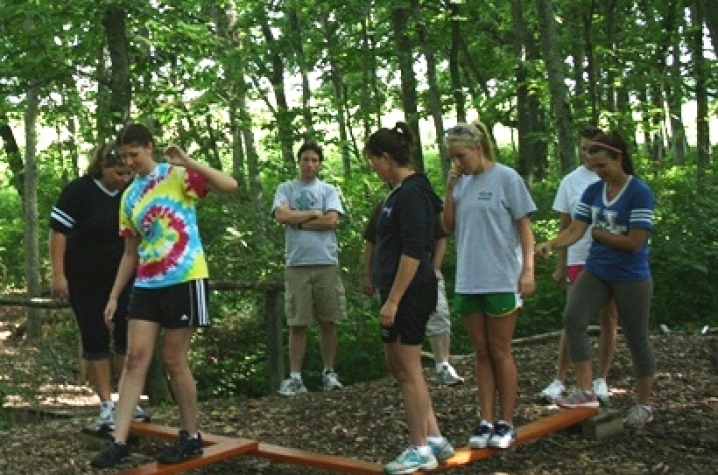UK Trauma/Surgical Nurses Participate in Unique Play to Learn Challenge

LEXINGTON, Ky. (July 5, 2011) − The challenges that hospital nurses face every day caring for seriously ill patients can be a lot like trying to walk a tight rope or balancing on a teeter-totter.
A team of newly hired UK HealthCare trauma/surgical nurses recently left the confines of the hospital and took to the great outdoors to walk a tight rope, literally, in an effort to sharpen the skills necessary to overcome those challenges and improve patient care.
The team of 17 trauma/surgical nurse residents as well as UK trauma physicians Dr. Andrew Bernard and Dr. Phillip Chang, participated in a series of activities at the Life Adventure Center of the Bluegrass in Versailles, Ky.
The nurse residents are part of the Bachelor of Science in Nursing (BSN) Program and are required to participate in the program as part of their transition from their roles as nursing students to UK HealthCare employees. The BSN Residency program is a one-year educational and support program for new BSN graduates in a bedside role, providing regular contact with expert nurses, peers and facilitators as they transition from student to their new nurse professional role within the hospital setting.
"What we are doing is choosing to try a non-traditional method of teaching," said Carol Noriega, clinical nurse specialist and facilitator of the program. The new approach to learning uses the service line model of care, which is structured around a multidisciplinary team of caregivers proving patient care throughout all phases of illness. The lessons taught are the same lessons typically received in a traditional classroom setting.
The Life Adventure Center of the Bluegrass (LAC) provided the perfect non-traditional classroom setting for this unique method of teaching. LAC is a 575-acre farm with challenge courses that allow individuals and groups to explore building communication skills, problem-solving and decision-making skills, goal-setting and thinking outside of the box.
LAC's programming is grounded in the philosophy that people learn best through experience and active participation. This is based on Dale's Cone of Experience which states people learn more by what they "do" as opposed to what they hear, read or observe.
"We can't imagine the stress nurses go through but we can appreciate it," said Don Fulford, executive director of LAC. "They're here to make UK a better place and their communities a better place and we are excited and humbled to be a part of that important process."
The topic for the day's activities was the changing patient condition using F.A.D.E. (Focus, Analyze, Develop, Execute), a four-step method of problem solving by the team.
One activity included each participant describing a situation where they were faced with a difficult patient situation and the support that was needed to deal with the situation. At that point, everyone on the team joined in to discuss problem-solving.
After each member presented their particular situation, he or she found a position on a large wooden teeter-totter. It took the team to problem-solve and it took the entire team to maintain balance both on and off the teeter-totter.
"The more closely the team works together, the better the care for patients," Bernard said.
Sometimes teamwork, specifically physician-nurse collaboration, can be intimidating, especially for a newly hired nurse still navigating his/her way in a new environment and with new people. Noriega said one goal of the challenge course was to foster physician-nurse relationships and build a level of comfort that will break down any walls or barriers to communication.
"The reason we are doing these exercises is because we want to be on the forefront of physician-nurse collaboration," said Chang. "Everyone knows what they are supposed to do, but we want to be the first unit to perfect that relationship and share it with the rest of the hospital. Once we establish this as the expected routine, there will be a culture change."
At the end of the day's activities, the nurse residents shared a meal together and reflected on their new experiences. Everyone agreed that having doctors there participating with them made a difference.
"My favorite part of the challenge course was interacting and problem-solving with the physicians in a different setting which made it less intimidating," said Heather Brown, trauma intensive care unit (TICU). "It's going to make a difference when we do rounds together and it will improve the way we communicate and problem solve.
Paul Boblett, trauma acute care nurse, liked walking the tightrope and using the cables. He noted that the whole team was interacting more while playing and learning. Kirsten Lovas, TICU nurse, said it was great to see the support the physicians had for them. Melissa Ryan, Surgical ICU nurse agreed. "They care about us," Ryan said. "It's nice to hear they have the same frustrations as we do and hopefully things will be improved."
UK HealthCare and the UK College of Nursing have partnered to participate in the national University Health Systems Consortium/American Association of Colleges of Nursing (UHC/AACN) Nurse Residency Program since 2002. More than 20,000 nurses have completed the UHC/AACN program nationwide and the results have included positive outcomes in stress reduction, increased competence and leadership skills and higher retention rates.
At UK, approximately 498 nurses have completed the program as of June 2010. Jeanne Bouvier (UK HealthCare) and Claudia Diebold (UK College of Nursing) co-coordinate the UK BSN Residency Program. UK was one of six original medical centers and Colleges of Nursing to participate in this innovative program.
MEDIA CONTACT: Ann Blackford at (859) 323-6442 or ann.blackford@uky.edu




